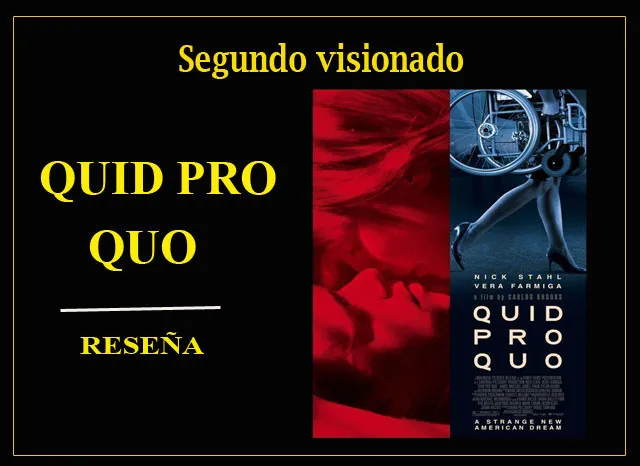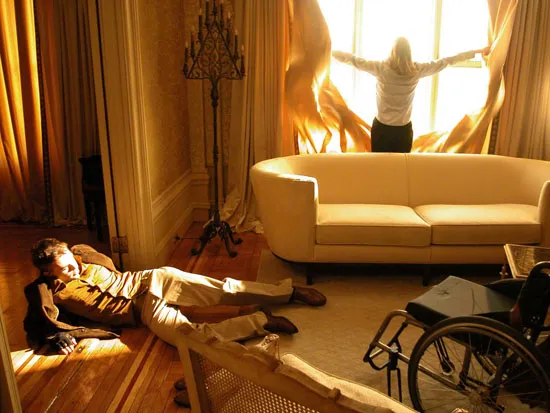
La relación cuerpo mente a veces es problemática, no todos se sienten a gusto con el cuerpo en que vinieron al mundo. Algunos consideran que sus proporciones no encajan dentro de los marcos impuestos por la estética corporal moderna: son muy chiquitos, o muy gorditos, o tienen el tronco muy corto, en fin…Otros perciben el cuerpo como una equivocación, como una trampa que los obliga a vivir una vida que no es, es el caso de los que se sienten varón o hembra en un cuerpo con características contrarias.
Esta película, Quid Pro Quo (2008), narrada a modo de thriller psicológico, ópera prima del director estadounidense Carlos Brooks, y premiada en el Festival de cine independiente de Sundance 2008, explora esos conflictos mente-cuerpo en una dimensión, que por lo menos yo no había visto antes en el cine.

Isaac Knott (Nick Stahl), a quien recuerdo por su interpretación de John Connor en Terminator 3, es un joven postrado en una silla de ruedas como consecuencia de un accidente de tránsito en la infancia; tiene un programa de radio en una emisora pública de Nueva York. El joven locutor es bastante conocido y muy apreciado por su estilo y su cálida voz. En sus programas Isaac cuenta historias, muchas de ellas en tono autobiográfico.
Aún cuando Isaac es completamente funcional sexualmente le cuesta encontrar parejas, porque en todas las citas las muchachas se desencantan, y se espantan, al verlo en silla de ruedas. Una solidaria compañera de la radio lo ayuda buscándole posibles citas que si puedan funcionar.
Un buen día recibe un correo electrónico donde le informan de un suceso muy extraño, un sujeto se presenta en un hospital de la ciudad con una solicitud inusual: le pide a un joven médico que le ampute una pierna sana, por el trabajo le ofrece la cantidad de doscientos cincuenta mil dólares. Isaac le comenta el suceso a la gente de la radio y le encargan una investigación para presentarla luego en la programación habitual.
Una vez que Isaac comienza a investigar se encuentra con un grupo de personas desconcertantes llamados imitadores, todos tienen en común dos cosas: pueden andar perfectamente, no tienen ningún tipo de problemas para la marcha, pero albergan el profundo deseo de ser inválidos.
Para darse apoyo este grupo hace reuniones clandestinas donde pueden andar libremente en silla de ruedas. De alguna forma permanecen “en el closet”, no se atreven a presentarse ante sus familiares y amigos de ese modo. Mantienen su conflicto en privado.

Las reuniones también sirven para aclarar las ideas y tomar decisiones trascendentales, los más convencidos dan el paso definitivo y se hacen inválidos, bien sea mediante un “accidente”, dañándose la médula con una aguja larga, o tomando productos químicos, “El Ginger Jake”, que destruyen las células nerviosas.
En un momento de la investigación Isaac se encuentra con Fiona, interpretada por Vera Farmiga, ella pertenece al grupo de los imitadores y está próxima a hacer su primera aparición pública en silla de ruedas. Entre los dos se establece una relación basada en el deseo de ambos de conocer el mundo del otro, pero esa relación entre estos dos encierra mucho más de lo que aparenta en un principio…


Desde el punto de vista narrativo la película arranca con mucha fuerza, es impactante encontrarse con este grupo de personas con un conflicto tan fuerte.
La reacción de Isaac, así como la de los espectadores, es de desconcierto, no entiende como personas que tiene tanta autonomía para desplazarse, con tantas ventajas para la vida cotidiana, quieran estar en una situación como la de él, que implica tantos problemas. Porque la verdad es que aún en una ciudad como Nueva York, donde hay normativas a favor del discapacitado, el mundo está diseñado para los andantes. Uno de los serios problemas que tiene Isaac es conseguir un taxi que lo quiera llevar. Los taxistas prefieren no perder tiempo con él y siguen de largo.
Una pregunta se instala en la mente de Isaac durante toda la película: ¿por qué quieren estar discapacitados?
Luego del encuentro con Fiona la película pierde un poco de brío, sin que ello signifique caer en el aburrimiento. El director Brooks tiene la habilidad de dosificar muy bien los enigmas de la trama y deja caer pistas que generan confusión y preparan el terreno para un desenlace inesperado.
Al principio no queda muy claro qué busca Fiona con Isaac, porque es ella la que ha provocado el encuentro de ambos. Hay una escena donde hacen el amor y Fiona mantiene a Isaac pegado a la silla, alternado las caricias entre el cuerpo y las ruedas, esta toma dura el tiempo necesario para que no pase desapercibida; el director hábilmente explota el poder del sexo para atrapar la atención del espectador y le tiende una pequeña trampa, quizá para que piense que la película seguirá desarrollándose por los tópicos del fetichismo, pero el asunto va por otro lado.
El desenlace de los últimos minutos toma un ritmo frenético, allí encaja todo el rompecabezas, y puede ser que si no se está atento se puedan perder algunas claves importantes para la interpretación.

Un asunto que me gustó de la película es el tratamiento sobrio que hace el director al presentar la situación del discapacitado. Allí no hay melodramas innecesarios, nada de pobrecitos o cosas por el estilo. Nick hace su vida lo más “normal” posible. Vive solo y es completamente autosuficiente, se asea, hace sus compras y se desplaza por toda la ciudad.
Me impactó el tema de la disconformidad con el cuerpo, de cómo la mente puede entrar en completa contradicción con el envoltorio en que se encuentra. No dejo de pensar en la pregunta de Isaac: ¿por qué lo hacen? Las razones pueden ser muchísimas y debo reconocer que todas escapan a mi entendimiento.

El director Brooks veladamente deja caer algunas explicaciones. Una es los conflictos familiares. Esta hipótesis la deja ver en una breve e intensa escena donde Fiona discute fuertemente con su madre por la falta de fe de la segunda sobre las habilidades de la primera. Sobre esto Nick deja en el aire una pregunta que pudiera restar peso a esa relación: ¿Por qué te importa tanto lo que tu madre piensa? Otra explicación tiene que ver directamente con la condición de Nick y va por la vía de las múltiples manifestaciones de la histeria.
Esta primera película del director Carlos Brooks quizá no sea una obra maestra, pero indudablemente que tiene muchos méritos, uno de ellos es que el mismo Brooks escribió el guión, por cierto, muy bien desarrollado. La fotografía cumple plenamente su papel de mostrar las atmósferas que se necesitan, hay muchos planos cerrados en ambientes claustrofóbicos, con colores opacos, lúgubres, reforzando la idea del estar atrapado, central dentro del conflicto de los imitadores. La banda sonora en ningún momento suena discordante.
La actuación de Nick Stahl y Vera Farmiga es de primera, ambos se lucen en sus papeles. Vera tiene un repertorio de situaciones donde puede explotar su calidad actoral, pasa de momentos tiernos, amables, muy dulces, a una rabia explosiva, todo con mucha naturalidad.
Si les gustan las películas de conflictos psicológicos, tratamientos de temas intimistas, y que den mucho que pensar, puede ser que Quid Pro Quo sea de su agrado.
Esta serie lleva el nombre de “segundo visionado” porque son películas que vi en algún momento y que forman parte de mi videoteca personal.
Gracias por tu tiempo.


The body-mind relationship is sometimes problematic, not everyone feels comfortable with the body they were born with. Some consider that their proportions do not fit within the frameworks imposed by modern body aesthetics: they are too small, or too fat, or have a very short trunk, in short... Others perceive the body as a mistake, as a trap that forces them to live a life that is not, it is the case of those who feel male or female in a body with opposite characteristics.
This film, Quid Pro Quo (2008), narrated as a psychological thriller, the debut feature of American director Carlos Brooks, and winner of an award at the 2008 Sundance Independent Film Festival, explores these mind-body conflicts in a dimension that I, at least, had not seen before in cinema.

Isaac Knott (Nick Stahl), whom I remember from his portrayal of John Connor in Terminator 3, is a young man confined to a wheelchair as a result of a childhood car accident; he has a radio show on a New York public radio station. The young broadcaster is well known and well liked for his style and warm voice. In his programs Isaac tells stories, many of them autobiographical in tone.
Even though Isaac is fully functional sexually, he has a hard time finding partners, because every time he goes out on a date, the girls are disenchanted, and shocked, to see him in a wheelchair. A supportive radio colleague helps him by finding him possible dates that might work.
One day he receives an email informing him of a very strange event, a guy shows up at a hospital in the city with an unusual request: he asks a young doctor to amputate a healthy leg, for the job he offers him the amount of two hundred and fifty thousand dollars. Isaac tells the people at the radio station about the event and they commission him to do an investigation, to be presented later in the regular programming.
Once Isaac begins to investigate he meets a group of puzzling people called impersonators, all of them have two things in common: they can walk perfectly, they have no walking problems, but they harbor a deep desire to be invalids.
To give each other support, this group holds clandestine meetings where they can walk freely in wheelchairs. Somehow they remain "in the closet", they do not dare to present themselves to their family and friends in that way. They keep their conflict private.

The meetings also serve to clarify ideas, the most convinced take the final step and become invalids, either by an "accident", damaging their spinal cord with a long needle, or by taking chemicals, "Ginger Jake", which destroy nerve cells.
At one point in the investigation Isaac meets Fiona, played by Vera Farmiga, she belongs to the group of impersonators and is about to make her first public appearance in a wheelchair. Between the two a relationship is established based on the desire of both to know the world of the other, but that relationship between these two contains much more than it appears at first...


From the narrative point of view, the film starts very strongly, it is shocking to meet this group of people with such a strong conflict.
Isaac's reaction, as well as that of the viewers, is one of bewilderment, he does not understand how people who have so much autonomy to move around, with so many advantages for everyday life, want to be in a situation like his, which involves so many problems. Because the truth is that even in a city like New York, where there are regulations in favor of the disabled, the world is designed for walkers. One of the serious problems Isaac has is getting a cab to take him. Cab drivers prefer not to waste time with him and drive on.
One question settles in Isaac's mind throughout the film: why do they want to be disabled?
After the encounter with Fiona, the film loses a bit of steam, but that doesn't mean it becomes boring. Director Brooks has the ability to dose very well the enigmas of the plot and drops clues that generate confusion and set the stage for an unexpected outcome.
At the beginning it is not very clear what Fiona is looking for with Isaac, because she is the one who has provoked their meeting. There is a scene where they make love and Fiona keeps Isaac glued to the chair, alternating caresses between the body and the wheels, this shot lasts long enough for it not to go unnoticed; the director skillfully exploits the power of sex to catch the viewer's attention and sets a little trap, perhaps to make him think that the film will continue to develop by the topics of fetishism, but the matter goes elsewhere.
The denouement of the last minutes takes a frenetic pace, there fits the whole puzzle, and it may be that if you are not attentive you can miss some important clues to the interpretation.

One thing I liked about the film is the director's sober treatment of the handicapped person's situation. There is no unnecessary melodrama, nothing about the poor or anything like that. Isaac lives his life as "normal" as possible. He lives alone and is completely self-sufficient, grooms himself, does his shopping and gets around town.
I was struck by the theme of nonconformity with the body, of how the mind can come into complete contradiction with the wrapper it is in. I kept thinking about Isaac's question: why do they do it? The reasons could be many, and I must admit that they all escape my understanding.

Director Brooks veiledly drops a few explanations. One is family conflicts. This hypothesis is shown in a brief and intense scene where Fiona fights strongly with her mother because of the latter's lack of faith in the former's abilities. On this Isaac leaves in the air a question that could detract from that relationship: Why do you care so much about what your mother thinks? Another explanation has to do directly with Isaac's condition and goes by way of the multiple manifestations of hysteria.
This first film by director Carlos Brooks may not be a masterpiece, but it undoubtedly has many merits, one of them being that Brooks himself wrote the screenplay, which, by the way, is very well developed. The photography fully fulfills its role of showing the necessary atmospheres, there are many closed shots in claustrophobic environments, with opaque, gloomy colors, reinforcing the idea of being trapped, central within the conflict of the imitators. The soundtrack at no point sounds jarring.
The acting by Nick Stahl and Vera Farmiga is top notch, both excel in their roles. Vera has a repertoire of situations where she can exploit her acting quality, she goes from tender, kind, very sweet moments, to explosive rage, all very naturally.
If you like films with psychological conflicts, treatments of intimate themes, and that give a lot of food for thought, Quid Pro Quo may be to your liking.
This series is called "second viewing" because they are films that I have seen at some point and are part of my personal video library.
Thanks for your time.
Translated with www.DeepL.com/Translator (free version)







Te invito a apoyar este proyecto como witness y a formar parte de esta gran comunidad uniéndote a su Discord en el siguiente enlace:
Discord de la comunidad Cervantes

